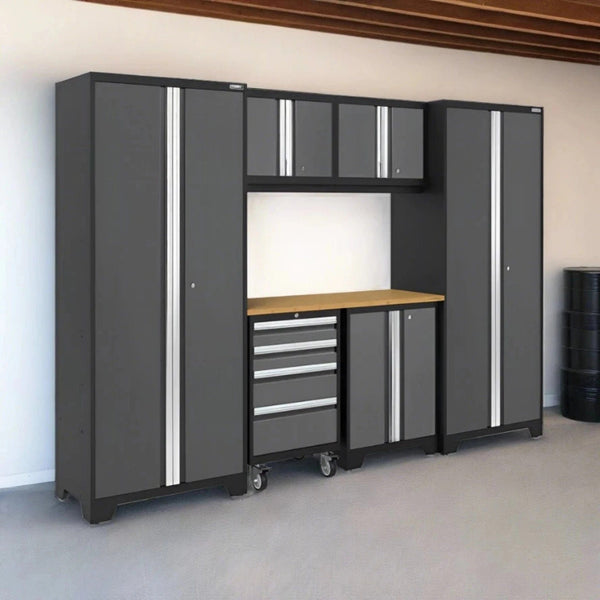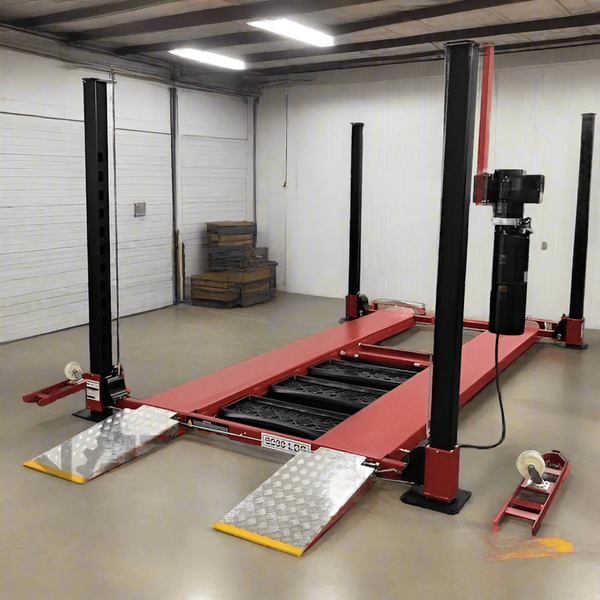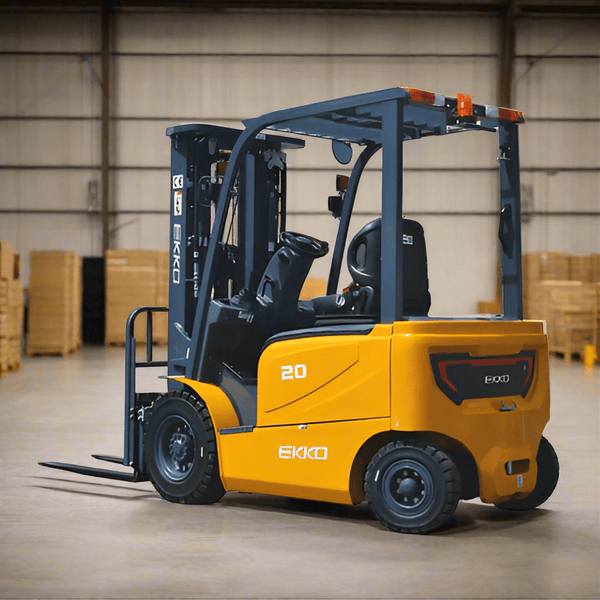
Atlas vs Rotary Lift
We help residential and commercial garages alike choose between an Atlas vs Rotary lift all the time. These two brands do have quite a few similarities, but it’s the differences you’re most interested in - and we’re going to break it all down for you below.
Rotary lifts are known for their heavy-duty build quality, which is why they’re used in dealerships and fleet facilities, with models ranging from 7,000 to 30,000 lbs. The brand has symmetric and asymmetric two-post options, always built with precision hydraulics and fast lift speeds. But, the higher cost and installation demands mean they tend to be best for large commercial spaces.
On the other hand, Atlas lifts deliver the same certified strength and reliability in a more affordable, easy-to-install package built for real garages. They’re versatile, durable, and designed to perform without the complexity or price tag of heavier systems.
You can learn more in our Atlas vs Rotary lift comparison below if you want to dive into the details. But the smarter option is simply connecting with our experts here at My Garage Supplies for one-on-one guidance in choosing the ideal car lift for garage.
We offer the best brands and their most popular models at unbeatable prices, backed by world-class customer service every step of the way. Elevate your shop’s workflow today!
Atlas vs Rotary Lift Comparison Chart
|
Spec / Feature |
Atlas Two-Post Lifts |
Rotary Two-Post Lifts |
|
Capacity Range (2-post) |
8,000–15,000 lb |
7,000–30,000 lb |
|
Configurations |
Base-plate & overhead; symmetric/asymmetric arms; low-profile pads |
Overhead & floorplate; symmetric/asymmetric arms; fast-rise hydraulics |
|
Install Requirements (typical) |
4–6″ slab (per model spec); fits common 9–12 ft ceilings |
Often 6″+ slab; taller bays common (≈12–14 ft) for many models |
|
Certification & Safety |
ALI-certified models; dual-point locks; automatic arm restraints |
ALI/ANSI testing; OEM/dealership spec options; advanced locks/controls |
|
Typical Price (street) |
$3,000–$8,000 |
$8,000–$25,000+ |
|
Maintenance & Parts Access |
Straightforward service; widely available wear parts |
Dealer-centric support; service programs for high-volume sites |
|
Warranty (typical) |
2-yr structural, 2-yr hydraulic, 1-yr power unit (model-specific) |
Up to 5-yr structural on many models (varies by model/region) |
|
Best Fit |
Independent shops & home garages needing pro performance, easy installs, strong value |
Dealerships, fleets, and heavy-duty bays prioritizing throughput and higher capacities |
Overview of Atlas Car Lifts
Whether you’re looking for a 2-post car lift or a 4-post car lift, Atlas is one of the top choices the industry has to offer. This brand strikes the perfect balance between performance and balance for most garages, and their lifts are some of our best-sellers here at My Garage Supplies.
The Atlas product line is engineered for every application, from professional mechanics to homeowners upgrading their garage setup. Atlas builds two-post, four-post, scissor, alignment, and specialty lifts covering weight capacities from 8,000 to over 18,000 lbs. Lifts combine durable steel construction with smart, straightforward design for the best of both worlds.
Atlas incorporates features like automatic safety locks, heavy-duty hydraulic cylinders, and reinforced columns that hold up over years of daily operation. There are low-profile pads for easy vehicle access, adjustable arms for different frame points, and both baseplate and overhead options to fit garages of all heights.
We carry quite a few other brands as well, like Triumph, Tuxedo, AMGO, and more. But Atlas stands out because it hits the sweet spot for engineering quality with real-world usability and affordability.
Atlas consistently delivers proven performance, excellent support, and the best value in professional-grade lifting. You don’t have to overbuy or overspend for your garage. Connect with our experts at My Garage Supplies today, and we’ll help you pick the perfect lift.
See how other lifts stack up in our comparisons of the Atlas vs Triumph lift or AMGO vs Atlas lift. But you came here specifically to learn about the Atlas vs Rotary lift, so let’s look at the other side of this conversation below.
Overview of Rotary Car Lifts
Rotary is one of the most established names in the automotive lift industry - so even though we don’t stock these lifts here at My Garage Supplies, they’re still a solid manufacturer.
The brand mainly supplies dealerships, fleet facilities, and large commercial shops. As you can imagine, that means these lifts have super-strong engineering and consistent build quality.
There is a wide range of models for any application and garage layout, including two-post, four-post, scissor, in-ground, and mobile column lifts - ranging in capacity from 7,000 to over 30,000 lbs. Every unit is ALI and ANSI certified, too.
Rotary lifts use high-speed hydraulic systems, precision-welded columns, and automatic safety locks so you get smooth, repeatable performance. Their asymmetric and symmetric two-post models handle everything from compact cars to heavy commercial vehicles with ease.
However, the same features that make Rotary ideal for heavy commercial use can make them less practical for smaller shops or home garages. Most models require reinforced concrete slabs, high ceiling clearance, and professional installation. This makes them more expensive upfront and to install.
Speaking of which, Rotary lifts run anywhere from $8,000 to $25,000+ - well above the budget most shops have for these types of lifts. The good news, though, is you can get the performance and reliability you need at a lower price point in an Atlas lift.
But will Atlas really work for you, or do you need to shell out for a more expensive Rotary lift? Let’s take a closer look at the Atlas vs Rotary lift models side by side below.
Atlas vs Rotary Lift: Side-by-Side Comparison
You’re getting dependable, ALI-certified equipment designed for professional use, whether you go with an Atlas vs Rotary lift. Both manufacturers are known for safety, consistent performance, and long-term durability. The main differences come down to capacity, cost, and fit.
Rotary caters to large-scale commercial shops, while Atlas offers the same certified strength and reliability at a more practical price and footprint for smaller garages. Here’s what you need to know…
Construction and Quality
Both of these brands create high-quality, commercial-grade lifts - but with a few nuances that matter. Rotary sits at the higher end of the spectrum with industrial-grade systems built for nonstop use in dealerships and fleet facilities.
That means you can expect thick, welded steel columns and carriages with precision-cut slide blocks designed for thousands of lift cycles every year. Models like the SPOA10 and SPO12 have fast hydraulic systems and premium powder-coated finishes to resist corrosion and wear. Just be aware these features add weight, complexity, and cost.
In contrast, Atlas builds lifts using high-strength steel in a form that’s easier to manage and service. The welds and hydraulic assemblies are rugged enough for daily professional use but simplified for faster installation and maintenance.
Safety locks, durable arm restraints, and reinforced baseplates guarantee dependable operation while minimizing the unnecessary bulk you’d get with a Rotary lift. Atlas lifts are engineered for long service life in real garages, not just large industrial bays.
Lift Types and Capacity
You’ll gain access to a range of lift styles and capacities no matter which brand you go with.
Rotary’s two-post lifts range from 7,000 to over 30,000 lbs, covering everything from compact cars to Class 6 trucks. You can choose from a symmetric vs asymmetric lift, but the brand also specializes in versymmetric lifts. Other styles include four-post lifts and scissor lifts.
There’s overlap between the Atlas vs Rotary lift as far as styles go. Atlas also manufactures two-post lifts (in symmetric AND asymmetric styles), four-post lifts, and car scissor lifts.
The difference comes down to capacity, as these range from 8,000-18,000lbs. That’s more than enough for more passenger cars, SUVs, and light trucks. It may not cut it if you service commercial fleets, though.
All that being said, Atlas’s baseplate and overhead designs fit smaller garages without compromising on capability. They’re the more practical choice for professional and home users in most cases.
Certification, Safety Systems, and Compliance
Both brands build ALI-certified lifts that meet industry standards for structural integrity and load security, so you can’t go wrong either way in that sense.
Rotary goes above and beyond with redundant locking systems, internal hydraulic fuses, and robust equalization cables to handle the constant strain of commercial duty. These lifts are commonly installed in OEM service centers that need compliance documentation.
Atlas provides the same safety certification using a simpler mechanical design with dual-point locks, automatic arm restraints, and hydraulic velocity fuses that prevent sudden descent. Systems are straightforward and dependable. Again, that’s exactly what the vast majority of garages are looking for in a car lift.
Installation and Space Requirements
We touched on this a bit earlier, but installation/space requirements is one of the most significant distinctions between an Atlas vs Rotary lift.
The former is simpler, usually needing just a 4” to 6” slab and ceilings as low as 9’ on baseplate models. Most Atlas lifts come partially assembled, cutting setup time in half. The hydraulic layout is plug-and-play, and both overhead/low-ceiling options are highly compatible.
Rotary lifts typically need 6” or thicker concrete slabs, which might mean overhauling your garage’s flooring. They also tend to need higher ceiling heights of 12’ to 14’. Large columns and crossbeams require professional setup, and some models use electrical synchronization systems that call for an electrician.
If you find yourself thinking about retrofitting your garage just to make a Rotary car lift work, ask yourself - is it really worth it? Our opinion is usually no, unless you know you’ll see an ROI by servicing much larger vehicles than an Atlas lift could accommodate. Speaking of ROI…
Price and Total Cost of Ownership
Rotary two-post lifts typically start around $8,000 and climb beyond $25,000, depending on configuration and capacity. That cost increases with installation, slab work, and optional accessories, as we just touched on above.
Meanwhile, Atlas lifts fall between $3,000 and $8,000 for most two-post systems, which include ALI-certified models with full safety features. Their hydraulic and electrical components use standard fittings, so maintenance costs tend to stay low. The total cost of ownership often works out to half of what you’d pay for a comparable Rotary lift.
Brand Support and Parts Availability
Rotary operates a large dealer network with training programs, service agreements, and factory support, designed mainly for high-volume customers. Parts are available but typically routed through authorized service partners. That can sometimes slow response times.
You won’t have to worry about that with Atlas lifts, though, especially when you purchase yours from My Garage Supplies. We offer direct parts access, expert technical help, and transparent pre-purchase guidance.
You can easily order replacement hydraulic cylinders, arms, or safety components without a service contract. That’s not to mention the financing options, installation support, and clear documentation you’ll gain access to as well. All in all, it’s easy to see why Atlas is the #1 choice.
Final Words on the Atlas vs Rotary Lift Comparison
This Atlas vs Rotary lift breakdown should leave you with total confidence choosing one or the other. Both make dependable, certified lifts, but Atlas stands out for everyday garages for quite a few reasons. You get the same lifting power, safety, and reliability at a lower cost, with easier installation and accessible parts support.
My Garage Supplies is your one-stop shop for car lifts, and we have similar comparisons for the Bendpak vs Atlas lift or Titan vs Atlas lift if you want to learn more. Otherwise, it’s time to take a look at our catalog and find the ideal fit for your workflow. OR, get a tailored recommendation!
Our customer service team knows car lifts inside and out. We’re ready to talk over your shop’s needs and budget. From there, we can point you in the right direction. Reach out now and streamline your garage’s efficiency, safety, and profitability!



